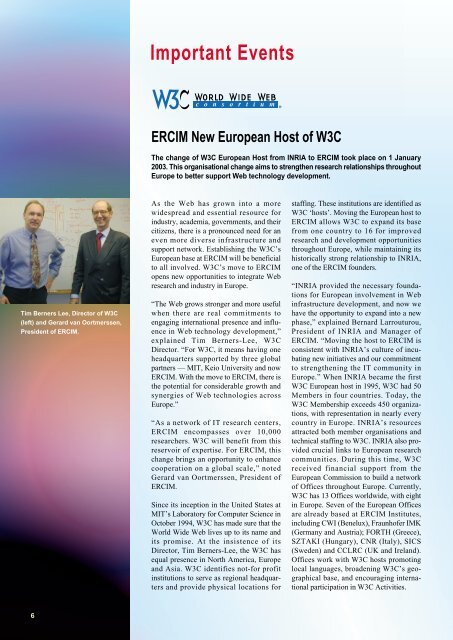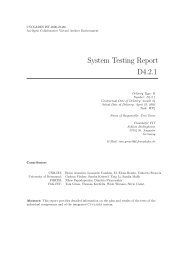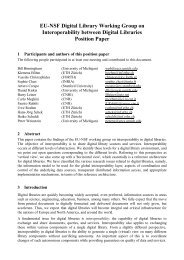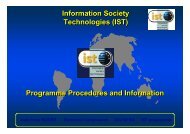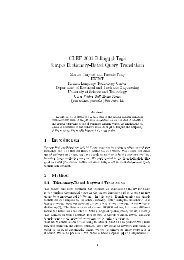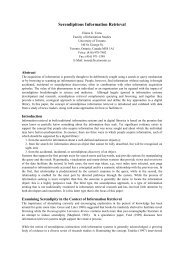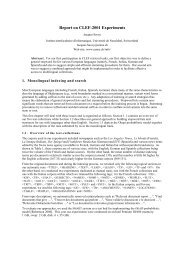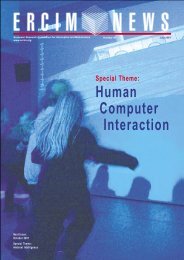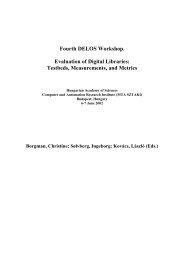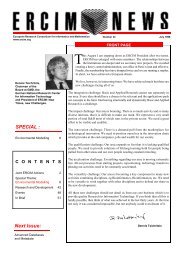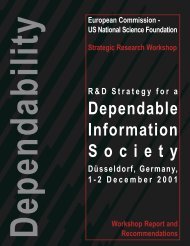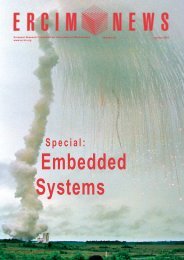Annual Report 2002 - ERCIM
Annual Report 2002 - ERCIM
Annual Report 2002 - ERCIM
Create successful ePaper yourself
Turn your PDF publications into a flip-book with our unique Google optimized e-Paper software.
Tim Berners Lee, Director of W3C<br />
(left) and Gerard van Oortmerssen,<br />
President of <strong>ERCIM</strong>.<br />
6<br />
Important Events<br />
<strong>ERCIM</strong> New European Host of W3C<br />
The change of W3C European Host from INRIA to <strong>ERCIM</strong> took place on 1 January<br />
2003. This organisational change aims to strengthen research relationships throughout<br />
Europe to better support Web technology development.<br />
As the Web has grown into a more<br />
widespread and essential resource for<br />
industry, academia, governments, and their<br />
citizens, there is a pronounced need for an<br />
even more diverse infrastructure and<br />
support network. Establishing the W3C’s<br />
European base at <strong>ERCIM</strong> will be beneficial<br />
to all involved. W3C’s move to <strong>ERCIM</strong><br />
opens new opportunities to integrate Web<br />
research and industry in Europe.<br />
“The Web grows stronger and more useful<br />
when there are real commitments to<br />
engaging international presence and influence<br />
in Web technology development,”<br />
explained Tim Berners-Lee, W3C<br />
Director. “For W3C, it means having one<br />
headquarters supported by three global<br />
partners — MIT, Keio University and now<br />
<strong>ERCIM</strong>. With the move to <strong>ERCIM</strong>, there is<br />
the potential for considerable growth and<br />
synergies of Web technologies across<br />
Europe.”<br />
“As a network of IT research centers,<br />
<strong>ERCIM</strong> encompasses over 10,000<br />
researchers. W3C will benefit from this<br />
reservoir of expertise. For <strong>ERCIM</strong>, this<br />
change brings an opportunity to enhance<br />
cooperation on a global scale,” noted<br />
Gerard van Oortmerssen, President of<br />
<strong>ERCIM</strong>.<br />
Since its inception in the United States at<br />
MIT’s Laboratory for Computer Science in<br />
October 1994, W3C has made sure that the<br />
World Wide Web lives up to its name and<br />
its promise. At the insistence of its<br />
Director, Tim Berners-Lee, the W3C has<br />
equal presence in North America, Europe<br />
and Asia. W3C identifies not-for profit<br />
institutions to serve as regional headquarters<br />
and provide physical locations for<br />
staffing. These institutions are identified as<br />
W3C ‘hosts’. Moving the European host to<br />
<strong>ERCIM</strong> allows W3C to expand its base<br />
from one country to 16 for improved<br />
research and development opportunities<br />
throughout Europe, while maintaining its<br />
historically strong relationship to INRIA,<br />
one of the <strong>ERCIM</strong> founders.<br />
“INRIA provided the necessary foundations<br />
for European involvement in Web<br />
infrastructure development, and now we<br />
have the opportunity to expand into a new<br />
phase,” explained Bernard Larrouturou,<br />
President of INRIA and Manager of<br />
<strong>ERCIM</strong>. “Moving the host to <strong>ERCIM</strong> is<br />
consistent with INRIA’s culture of incubating<br />
new initiatives and our commitment<br />
to strengthening the IT community in<br />
Europe.” When INRIA became the first<br />
W3C European host in 1995, W3C had 50<br />
Members in four countries. Today, the<br />
W3C Membership exceeds 450 organizations,<br />
with representation in nearly every<br />
country in Europe. INRIA’s resources<br />
attracted both member organisations and<br />
technical staffing to W3C. INRIA also provided<br />
crucial links to European research<br />
communities. During this time, W3C<br />
received financial support from the<br />
European Commission to build a network<br />
of Offices throughout Europe. Currently,<br />
W3C has 13 Offices worldwide, with eight<br />
in Europe. Seven of the European Offices<br />
are already based at <strong>ERCIM</strong> Institutes,<br />
including CWI (Benelux), Fraunhofer IMK<br />
(Germany and Austria); FORTH (Greece),<br />
SZTAKI (Hungary), CNR (Italy), SICS<br />
(Sweden) and CCLRC (UK and Ireland).<br />
Offices work with W3C hosts promoting<br />
local languages, broadening W3C’s geographical<br />
base, and encouraging international<br />
participation in W3C Activities.


